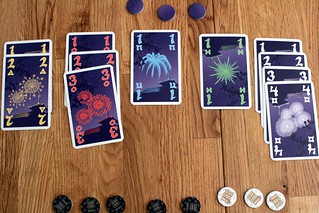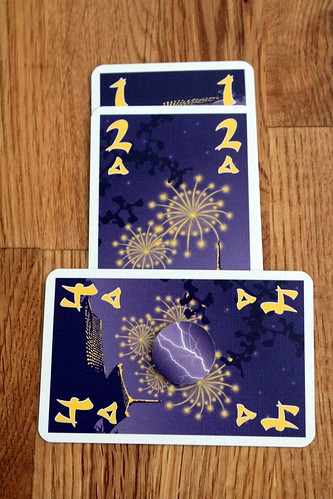| Strategy | Luck |
|---|---|
| Interaction | Components & Design |
| Complexity | Score |
Warning! Do not play this game in public. Spectators will take you for an idiot.
Or what would you think if you came across a group of people playing cards, and they’re all holding their cards the wrong way around, with the back facing them and the front showing to the other players? You’d either think they’re idiots, or that they’re playing a game with a very novel idea. And with Antoine Bauza’s Hanabi, it’s firmly the second option, which is why it earned a nomination for Spiel des Jahres 2013. In this cooperative card game, it’s by design that everyone but you knows your cards, the whole point of the game is that you have to rely on hints from the other players to know which card you can safely play to complete the firework.
Creating a firework is all that Hanabi is about. Apparently that’s obvious if you know Japanese, because that’s what hanabi means, but I wouldn’t know. The firework you really hope to show to the waiting audience paints the sky in five colours and with numbers from one to five in each. Not literally painting numbers in the sky, of course, that’s just the values of the cards. The goal is to have five full rows of cards, one in each colour, from one to five without interruptions. If you actually manage that, it’s called a Legendary Firework, but don’t expect to see it too often. After all, you can’t even see your own cards.To get any information at all which of your cards you should play, you have to rely on other player’s hints, which they may give you on their turn. A hint either points out all cards of one colour in your hand, showing their position to avoid confusion, or all cards of one value. “This, this and this card is red” is thus a valid hint, so is “all your cards are fours” or “you have no ones”. “All your cards are useless” is not a valid hint, to my deep regret, because that would make things easier sometimes. Only a limited number of hints may be given before something else has to happen, marked by eight hint markers which are turned over one by one for each hint you give.

To gain one back, someone must discard a card on their turn instead of doing anything else – this is where “all your cards are useless” would be incredibly handy, you could just get one player to discard every turn. Even to discard, you should have a good idea which card you’re picking because each card is only available twice (or once for fives and three times for ones – twice on average, anyway) and you need them all once to create the Legendary Firework. Dream on. The obvious third option on your turn is to play a card. If the card fits – meaning it’s either a one of a colour not yet played or another number where the lower number in that colour is already on the table – you may continue that line of cards. If the card doesn’t fit, however, you discard it and turn over one of the Lighting Markers. Turn all three and you lose the game. Playing a matching card doesn’t even turn back one of the Hint Markers, by the way, that only happens when you play a five and complete a line.
Hanabi sounds like a light deduction game initially, but while playing you quickly figure out that it’s nothing of that sort, at least not in the sense you’d expect. The strict rules what hints you are allowed to give prevent you from giving information to properly deduce from except in the most basic sense. You just can’t give enough hints to pass all the information, and you can’t use clever phrasing like “you have more red cards than any other player” to pass more information with one hint. Instead, why a certain hint was given comes into the focus. With no cards yet on the table, the hint “you have ones here, here and here” is close to jumping up and down on the table yelling “Play those cards!!!” while poking you with a pointy stick. The same hint when all the colours are already on the table obviously means you’re supposed to discard those. But what does it mean when someone tells you where your four green cards are when 1-2-3 in green is already on the table? Play? Discard? Which card? Getting inside the hint-givers head is more important than putting two hints together and realizing that a card you are holding is both green and a four. Obviously, a good memory helps, too: you want to remember all the hints given to you, of course, but also all the hints given to the other players, so you know which advice would be the most helpful for them.

Because of the way Hanabi works, you should play with more than two people when you can, it adds another layer of guessing intentions. Your thoughts will twist something like “okay, if I tell Player Three where he has two green cards, then Player Two can point out where his threes are, and because he already knows one of them is red he’ll then be able to play cards for the next two turns.” It may be overly convoluted to think like that, but I’m having fun with it. The game ends when either the third Lightning Marker is turned over, indicating that the gods are mightily displeased with your performance and send a thunderstorm, or when you put the last five on the table to create a Legendary Firework. In most cases, however, Hanabi ends when you draw the last card from the draw pile and you score based on how many cards you managed to play. A Legendary Performance scores a full 25 points, but any score above 10 is already considered okay, any score above 15 good. This point system is very necessary, because you shouldn’t get used to scoring Legendaries, even with some experience they’re hard. And if you do find yourself scoring consistently high, there is a variant with multicoloured cards as a sixth colour, and then there is a much harder variant where you have to point out multicoloured cards not as multicoloured when giving hints, but have to include them with all colours.
Hanabi is a very innovative game for sure, but not because of the way you hold your cards the wrong way round. The truly innovative part lies in how it forces you to convey meaning with your very limited communication and read intention from what other players tell you. I’ve played a good pile of deduction games, but I can’t remember a game that takes this direction with the genre. That, and it’s a cooperative game, I was pretty much destined to love it. My one small criticism is not even with the game itself but with the age indication: although the rules are easily light enough, I have some doubts that eight year olds will really grasp the importance of why information was given to them or how to translate advice what to do into the simple hints that Hanabi allows. You can play with kids, but don’t expect to be Legendary. On the other hand, you might just end up teaching your kids how to read someone’s intentions. That leaves me with no complaints at all, I’m happy with Hanabi.






